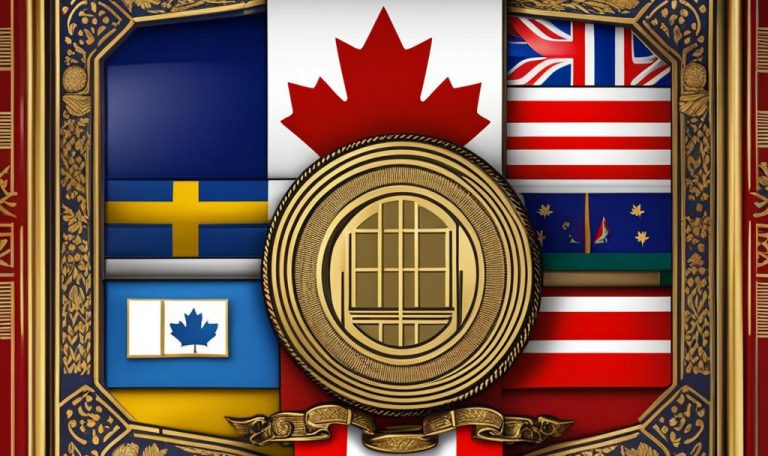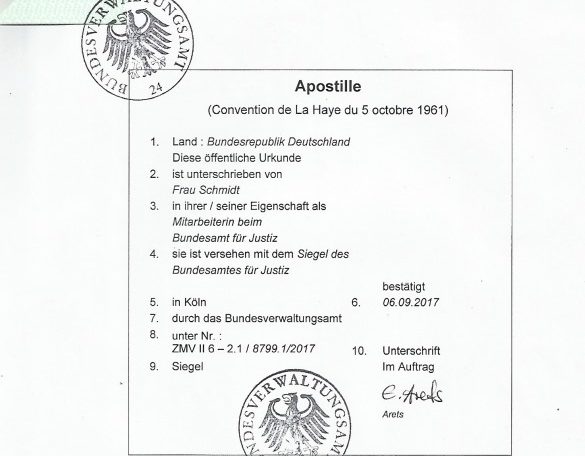Canada has some exciting news for its citizens and businesses. Starting from January 11, 2024, Canada will become a signatory of the Apostille Convention, also known as the Hague Apostille Convention. This is a significant development that has far-reaching implications for document authentication and acceptance on the international stage.
The Apostille Convention is an international treaty that simplifies the process of authenticating documents for use in foreign countries. It establishes a standardized certificate, known as an apostille, which verifies the authenticity of a document’s signature, seal, or stamp. This means that documents issued in one signatory country, such as Canada, can be accepted in over 120 other signatory countries without the need for additional steps of legalization or authentication by consular offices.
Key Takeaways:
- Canada will join the Apostille Convention on January 11, 2024.
- The Apostille Convention streamlines the document authentication process for Canadians.
- Documents with an apostille are accepted in over 120 signatory countries without further legalization.
- Canada’s participation in the convention enhances the recognition of Canadian documents internationally.
- It is important to understand the changes and requirements for document authentication under the new system.
Changes to Authentication Services in Canada
With the implementation of the Apostille Convention, there will be changes to authentication services in Canada. Currently, Global Affairs Canada issues authentication certificates for documents issued or notarized anywhere in Canada. However, starting from January 11, 2024, competent authorities in certain provinces will be responsible for issuing apostilles for documents issued or notarized within their jurisdictions. Global Affairs Canada will continue to issue apostilles for documents issued by the Government of Canada and for documents issued or notarized in specific provinces and territories.
This shift in responsibilities aims to streamline the Canada apostille process and ensure a smoother Canada Hague Convention implementation. By empowering competent authorities at the provincial level to issue apostilles, the Canada apostille services will become more accessible and efficient for individuals and organizations seeking canadian document legalization.
Under the new process, individuals and organizations will need to submit their documents to the appropriate competent authority in their province for canada document authentication.
This change will eliminate the need for all documents to go through Global Affairs Canada, reducing processing times and increasing convenience for Canadians.
It is important to note that while some responsibilities have shifted to competent authorities in certain provinces, Global Affairs Canada will still play a vital role in the canada apostille process. They will continue to issue apostilles for documents issued by the Government of Canada and for specific provinces and territories where competent authorities are not yet established.
Benefits of Changes to Authentication Services
- Streamlined and more accessible canada apostille process
- Reduced processing times
- Increased convenience for individuals and organizations
- Efficient canadian document legalization
These changes mark an important milestone in the authentication and legalization process in Canada, aligning it with international standards and making it easier for Canadian documents to be recognized globally, especially when immigrating to other countries. It is crucial for individuals and organizations to familiarize themselves with the specific requirements in their province as the Canada apostille services evolve.
Competent Authorities for Canada Apostille Services
The following table provides an overview of the competent authorities responsible for issuing apostilles in Canada:
| Provinces/Territories | Competent Authority |
|---|---|
| Alberta | Alberta Provincial Authority |
| British Columbia | British Columbia Provincial Authority |
| Manitoba | Global Affairs Canada |
| New Brunswick | Global Affairs Canada |
| Newfoundland and Labrador | Global Affairs Canada |
| Northwest Territories | Global Affairs Canada |
| Nova Scotia | Global Affairs Canada |
| Nunavut | Global Affairs Canada |
| Ontario | Ontario Provincial Authority |
| Prince Edward Island | Global Affairs Canada |
| Quebec | Quebec Provincial Authority (subject to required government approvals) |
| Saskatchewan | Saskatchewan Provincial Authority |
| Yukon | Global Affairs Canada |
It is important to consult the competent authority in your province for the most up-to-date information and requirements regarding document authentication and canadian document legalization in your jurisdiction.
Documents Requiring Apostilles from Global Affairs Canada
Global Affairs Canada plays a crucial role in the issuance of apostilles for certain Canadian documents. These apostilles are essential for ensuring the authenticity and recognition of these documents in international settings. Here is a breakdown of the documents that require apostilles from Global Affairs Canada:
Government of Canada-issued documents:
- Passports
- Visas
- RCMP Criminal Records
- Birth certificates
- Marriage certificates
- Death certificates
Documents issued or notarized in the following provinces and territories:
- Manitoba
- New Brunswick
- Newfoundland and Labrador
- The Northwest Territories
- Nova Scotia
- Nunavut
- Prince Edward Island
- Yukon
It is important to note that while some documents may require notarization before being authenticated, others may not. The specific requirements for each document can vary, so it is advisable to consult the relevant guidelines and contact Global Affairs Canada if needed.
| Document Type | Issuing Authority | Authentication Requirement |
|---|---|---|
| Government-issued documents (e.g., passports) | Government of Canada | Apostille from Global Affairs Canada |
| Provincially-issued documents | Provinces and territories: Manitoba, New Brunswick, Newfoundland and Labrador, the Northwest Territories, Nova Scotia, Nunavut, Prince Edward Island, Yukon | Apostille from Global Affairs Canada |
Please review the specific requirements for each document type and jurisdiction to ensure a smooth and efficient authentication process.

Documents Requiring Apostilles from Provincial Competent Authorities
Starting from January 11, 2024, competent authorities in Alberta, British Columbia, Ontario, Quebec (subject to the required government approvals), and Saskatchewan will be responsible for issuing apostilles for documents issued or notarized within their respective provinces. If a document was notarized in any of these provinces, it must be sent to the competent authority of that province for authentication.
In Quebec, the competent authority can authenticate a notarized document only if the original document was issued in the province.
Benefits of Apostilles from Provincial Competent Authorities:
- Streamlined Process: Instead of sending documents to Global Affairs Canada, individuals in Alberta, British Columbia, Ontario, Quebec, or Saskatchewan will have a more efficient process for obtaining apostilles, as they will not need to involve the federal authority for provincial documents.
- Local Accessibility: With the responsibility for issuing apostilles delegated to provincial competent authorities, individuals can enjoy greater accessibility as they can directly submit their documents to the relevant authorities within their respective provinces.
- Timeliness: By eliminating the need to involve a centralized authority, the processing time for obtaining apostilles for provincial documents is expected to be reduced, allowing individuals to access their authenticated documents more quickly.
It is important to note that individuals and organizations outside of Alberta, British Columbia, Ontario, Quebec, and Saskatchewan will still need to submit their documents to Global Affairs Canada for apostille authentication.
| Province | Competent Authority |
|---|---|
| Alberta | Alberta Authentication and Legalization Services |
| British Columbia | BC Ministry of Attorney General – Authentication and Service of Process |
| Ontario | Office of the Registrar General – Document Authentication and Service of Process Branch |
| Quebec | Ministère des Relations internationales et de la Francophonie |
| Saskatchewan | Saskatchewan Ministry of Justice and Solicitor General – Authentication Services |
Time Limits and Submission Requirements for Documents
Time is of the essence when it comes to submitting documents for apostille authentication in Canada. Global Affairs Canada will continue to accept documents issued or notarized in Alberta, British Columbia, Ontario, Quebec, or Saskatchewan until January 10, 2024.
To ensure a smooth process, it is crucial to submit these documents before the deadline, following the current requirements outlined on the Authentication of Documents website. Failure to meet the submission deadline may result in the return of your documents without authentication.
For documents notarized in other provinces, territories, or countries, the submission requirements are determined by the competent authorities or foreign representative offices. It is essential to familiarize yourself with the specific requirements for each jurisdiction to avoid any delays or complications.
Properly adhering to the submission deadlines and requirements will help expedite the apostille process and ensure your documents are accepted internationally.
| Document Submission Deadlines | Submission Requirements |
|---|---|
| Alberta, British Columbia, Ontario, Quebec, or Saskatchewan | Submit documents before January 10, 2024 |
| Other provinces, territories, or countries | Follow the requirements outlined by competent authorities or foreign representative offices |
Authentication of Documents Already Submitted
If you have already submitted a document for authentication to Global Affairs Canada before November 19, 2023, there is an opportunity to request a change from an authentication certificate to an apostille. The apostille can be requested by contacting Global Affairs Canada’s Authentication Services. However, it is important to note that if your document has already been authenticated before the Apostille Convention comes into effect, it may still require legalization by the foreign representative office of the destination country.
In some cases, documents that have already been authenticated may still need to go through the additional steps of legalization in the destination country. This means that even though Canada is joining the Apostille Convention, there could still be instances where further legalization is necessary. It is advisable to check with the relevant foreign representative office to confirm the specific requirements for your document.

Using Canadian Documents in Apostille Convention Signatory Countries
If a Canadian document has already been authenticated before the Apostille Convention comes into effect, it may still need to be legalized by the foreign representative office of the destination country, even if the country is a signatory of the Apostille Convention. It is advised to contact the consular office of the specific country to find out its requirements for document legalization. The list of foreign representatives in Canada can be found on the Authentication Services website.
When using Canadian documents in apostille convention signatory countries, it is important to understand the specific requirements for document legalization. While the apostille convention simplifies the authentication process, some countries may still require additional steps for acceptance of Canadian documents. To ensure smooth document recognition, contacting the consular office of the destination country is highly recommended. They can provide valuable information on the necessary procedures and any additional documents that may be required.
Foreign representative offices play a crucial role in the document legalization process. They act as intermediaries between individuals or organizations in Canada and the host country. These representatives help ensure that Canadian documents comply with the legal requirements of the country where they will be used. Therefore, it is advisable to consult the list of foreign representatives available on the Authentication Services website. This list contains contact information for consulates, embassies, and other official offices representing foreign governments in Canada.
By reaching out to the appropriate consular office, individuals and organizations can gather accurate and up-to-date information on the specific document legalization procedures for the desired destination country. This proactive approach helps avoid any delays or issues that may arise during the authentication process and ensures that Canadian documents are fully recognized and accepted abroad.
| Country | Consular Office Contact Details |
|---|---|
| United States | Embassy of the United States +1 613-238-5335 usconsottawa@state.gov |
| United Kingdom | British High Commission Ottawa +1 613-237-1530 ottawa.consular@fco.gov.uk |
| France | Embassy of France in Canada +1 613-593-7405 consulat.ottawa-amba@diplomatie.gouv.fr |
| Germany | Embassy of the Federal Republic of Germany +1 613-232-1101 info@ottawa.diplo.de |
Using Canadian Documents in Non-Signatory Countries
From January 11, 2024, Global Affairs Canada will issue apostilles for all documents, regardless of whether they will be used in a signatory country or a non-signatory country of the Apostille Convention. This means that Canadians will have the convenience of obtaining apostilles for their documents, making them more widely accepted internationally.
However, it’s important to note that if a Canadian document needs to be used in a non-signatory country, it may still require additional steps for authentication and legalization. While the apostille will authenticate the document in Canada, the destination country may require further verification by a competent authority in Canada and subsequent legalization by its foreign representative office.
The specific requirements for each non-signatory country can vary, so it’s crucial to contact the foreign representative office of the destination country for their guidelines on document legalization. They will be able to provide you with the necessary information and procedures to ensure the smooth acceptance of your Canadian documents.
Conclusion – Canada joins the Apostille Convention
The recent decision of Canada to join the Apostille Convention marks a significant milestone in the country’s document authentication process. This move will greatly simplify and expedite the authentication of Canadian documents, allowing them to be easily accepted in over 120 countries that are part of the convention. The implementation of apostilles will effectively eliminate the need for additional legalization steps, saving both time and effort for individuals and organizations.
By becoming a signatory of the Hague Apostille Convention, Canada has taken a proactive step towards enhancing the international recognition and validity of its documents. This development will be particularly beneficial for Canadians who frequently require document authentication for various purposes, such as studying abroad, conducting business internationally, or immigrating to another country.
It is crucial for individuals and organizations to familiarize themselves with the changes brought about by Canada’s membership in the Apostille Convention. Understanding the new requirements and procedures will ensure a smooth and efficient authentication process, saving valuable time and avoiding potential delays or complications.
In conclusion, Canada’s decision to join the Apostille Convention opens up new possibilities for Canadians, streamlining the document authentication process and enabling easier acceptance of Canadian documents abroad. This development will undoubtedly facilitate international interactions and contribute to the growth of cross-border activities in various sectors. As Canada embraces the benefits of the Apostille Convention, individuals and organizations can look forward to a more seamless and effective authentication process for their documents.
FAQ
What does it mean that Canada joins the Apostille Convention?
Canada becoming a signatory of the Apostille Convention means that the document authentication process for Canadians will be streamlined. It will be easier for their documents to be accepted in over 120 countries that have signed the convention. The apostille certificate, which will be included in authenticated documents, eliminates the need for additional legalization steps by consular offices in destination countries.
What changes will there be to authentication services in Canada?
With the implementation of the Apostille Convention, competent authorities in certain provinces will be responsible for issuing apostilles for documents issued or notarized within their jurisdictions. Global Affairs Canada will continue to issue apostilles for documents issued by the Government of Canada and for documents issued or notarized in specific provinces and territories.
Which documents will require apostilles from Global Affairs Canada?
Global Affairs Canada will issue apostilles for documents issued by the Government of Canada and for documents issued or notarized in Manitoba, New Brunswick, Newfoundland and Labrador, the Northwest Territories, Nova Scotia, Nunavut, Prince Edward Island, and Yukon.
Which documents will require apostilles from provincial competent authorities?
Starting from January 11, 2024, competent authorities in Alberta, British Columbia, Ontario, Quebec (subject to the required government approvals), and Saskatchewan will be responsible for issuing apostilles for documents issued or notarized within their respective provinces.
What are the time limits and submission requirements for documents?
Global Affairs Canada will accept documents issued or notarized in Alberta, British Columbia, Ontario, Quebec, or Saskatchewan until January 10, 2024. It is important to submit these documents before the deadline following the current requirements found on the Authentication of Documents website. After January 11, 2024, any documents received will be returned without authentication. The submission requirements for documents notarized in other provinces, territories, or countries are outlined by competent authorities or foreign representative offices.
What about the authentication of documents already submitted?
Global Affairs Canada will continue to issue authentication certificates until January 10, 2024. If you have a pending request for a document submitted before November 19, 2023, and would like an apostille instead of an authentication certificate, you can request the change by contacting Global Affairs Canada’s Authentication Services. However, if a document has already been authenticated before the Apostille Convention comes into effect, it may still require legalization by the foreign representative office of the destination country.
Can Canadian documents be used in Apostille Convention signatory countries?
Yes, Canadian documents with apostilles can be used in signatory countries of the Apostille Convention. The apostille will simplify the process of document authentication for Canadians and enhance their ability to use Canadian documents internationally.
Can Canadian documents be used in non-signatory countries?
If a Canadian document needs to be used in a non-signatory country, it may still require authentication by a competent authority in Canada and subsequent legalization by the foreign representative office of the destination country. The specific requirements for each non-signatory country can be obtained by contacting its foreign representative in Canada.
How will Canada’s joining of the Apostille Convention benefit Canadians?
Canada becoming a signatory of the Apostille Convention will simplify the process of document authentication for Canadians and enhance their ability to use Canadian documents in signatory countries. The implementation of apostilles will eliminate certain steps and make it more convenient for documents to be recognized internationally.



